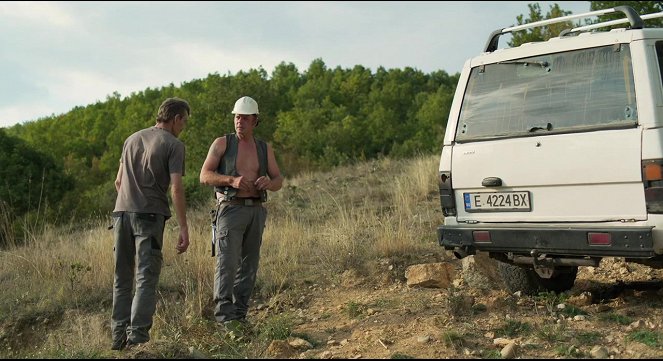Réalisation:
Valeska GrisebachScénario:
Valeska GrisebachPhotographie:
Bernhard KellerVOD (1)
Résumés(1)
Un groupe d’ouvriers allemands prend ses quartiers sur un chantier pénible aux confins de la campagne bulgare. Ce séjour en terre étrangère réveille le goût de l’aventure chez ces hommes, alors que la proximité d’un village les confrontent à la méfiance engendrée par les barrières linguistiques et les différences culturelles. Rapidement, le village devient le théâtre de rivalités entre deux d’entre eux, alors qu’une épreuve de force s’engage pour gagner la faveur et la reconnaissance des habitants. (Shellac)
(plus)Critiques (5)
Film agréable sur des personnes ordinaires et leur rencontre culturelle. Dans des dialogues bilingues allemands-bulgares, ils se comprennent tous les dix mots, mais vous conquièrent complètement malgré tout. La naturel, l'humanité, les émotions qui nous sont si proches, mais qui sont généralement absentes des films. Des choses inouïes peuvent être extraites de la non-acting si vous avez une intention de réalisation claire et un quotient émotionnel élevé. Delňas en tant que personnage principal est le plus charismatique de tous ceux que j'ai vus à Karlovy Vary cette année.
()
Nice work with plot motifs, narrative formulas and the iconography of the western, whose romanticism clashes with the unsentimentally depicted social reality of contemporary Europe, where borders that had been erased are being redrawn. Instead of cowboys conquering Indian country, a group of German workers colonise a Bulgarian village (flying the flag, saddling up on someone else’s horse, getting close to a local woman). The theme comprising the clash of two cultures is crucial, except it is more of a clash between East and West than between civilisation and wilderness. The members of the two sub-worlds between which the protagonist moves actually understand each other less than they outwardly appear to. An ambiguous loner for whom freedom is evidently more important than family. Despite that, however, he clearly wants to belong somewhere, to be accepted by others (but it’s hard to say what exactly he desires, as concealing his emotions is part of his nature). For my taste, however, there were too many mood-evoking shots of the wandering protagonist holding a cigarette, the frequency of which probably has something to do with the looser structure of the story, which gives the impression of having been created “on the fly”. In terms of style and narrative structure, the film reminded me quite a lot of a long line of other festival dramas (the veristic shooting style, the final violent clash followed by catharsis), and the theme of western companies (and the possessive mentality) expanding into the “developing” countries of Eastern Europe was more aptly addressed in Maren Ade’s Toni Erdmann. 75%
()
A perfectly accurate character study and an ironic play on the genre. It is film about the inability to accept loneliness and the eternal desire to belong, even at the cost of denying oneself. Beautiful poetry of understanding without words.
()
Dans cette histoire-non-histoire d'une tentative par une bande de travailleurs allemands de nouer des relations avec les habitants bulgares du village où ils travaillent, on peut trouver de nombreuses idées et thèmes, mais il n'y a pas vraiment d'intrigue et c'est plutôt une série de scènes montrant comment les gens sont capables de se comprendre même sans connaître la langue, voire de se crêper le chignon. L'étude des personnages, qui évolue lentement avec en toile de fond la campagne bulgare, est intelligemment dirigée et interprétée avec brio par des non-acteurs naturels, mais en même temps elle est parfaitement calme, non dramatique, non immersive et ne raconte rien de précis qui puisse rester en mémoire.
()
The social drama Western is indeed aptly titled. The state of unsettling tension between a group of German workers working somewhere in a remote part of Bulgaria and the local villagers has the poetry of Western films. Especially when horses are quite often present in the shots and in the plot itself. Meinhard Neumann gives the impression that he was born for the title role. His charisma combined with his civilian acting gives the character the necessary depth and a certain amount of mystery. This film is certainly not just a mindless spectacle, but it highlights the serious problems that can arise when two different cultures clash. Here it is conceived from a purely European point of view as a conflict between the Eastern mentality and the Western material way of life. The main character gets caught up in the midst of both worlds, brilliantly demonstrating the desire to belong somewhere while simultaneously struggling to fit in. My only reservation would be the occasional dead spots in the story. (70%)
()

